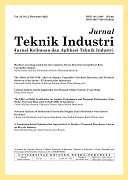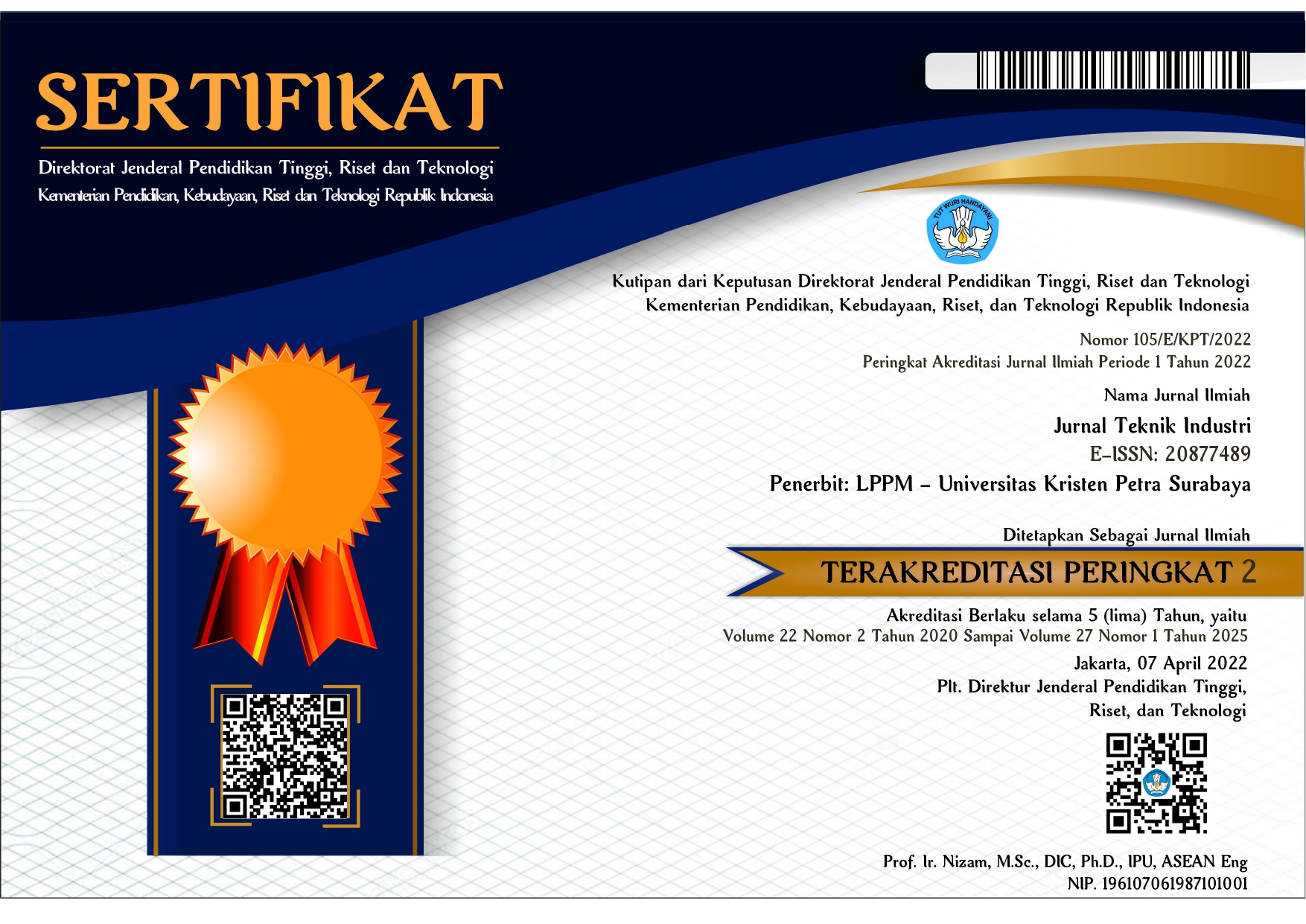The Effect of SNI 6729 : 2016 on Organic Vegetables Purchase Intention and Purchase Behavior (Case Study : PT Rumah Roti Indonesia)
DOI:
https://doi.org/10.9744/jti.24.2.95-104Abstract
At a time when the people's increasing demand for organic vegetables can be an opportunity for PT Rumah Roti Indonesia to expand its market beyond the scope of PT Rumah Roti Indonesia. Organic certification is one way to expand the market. The aim of this study is analyze the effect of SNI 6729: 2016 certification on purchase intention and purchase behavior of organic vegetables in Indonesia so that PT Rumah Roti can take the right decision. To see the effect of SNI 6729 : 2016, this study uses the Theory of Planned Behavior model. Data processing was used in the PLS-SEM method. The results of this study prove that the variables perceived behavioral control, subjective norms, and perceived quality have a significant effect on purchase intention in organic vegetables and awareness has a significant effect on moderating the relationship between purchase intention and purchase behavior. In addition, it was found that purchase intention has a significant effect on purchase behavior. These results indicate that there is an influence of SNI 6729 : 2016 on purchase intention and purchase behavior of organic vegetables.
Downloads
References
Nugroho, I. N., and Yuliawati, Y., Dampak Pandemi Covid-19 terhadap Manajemen dan Strategi Pemasaran Sayur Organik (Studi Kasus di Kelompok Tani Tranggulasi Desa Batur, Kabupaten Semarang), Jurnal Pemikiran Masyarakat Ilmiah Berwawasan Agribisnis, 7(2), 2021, pp. 1377-1392.
Handayani, S., Affandi, M. I., and Susanti, S, Analisis Karakteristik Mutu Beras Organik Varietas Mentik Susu Dan Sintanur, Journal of Food System & Agribusiness, 2(2), 2019, pp. 75–82.
Sutarni, S., Trisnanto, T. B., and Unteawati, B., Preferensi Konsumen Terhadap Atribut Produk Sayuran Organik di Kota Bandar Lampung, Jurnal Penelitian Pertanian Terapan, 17(3), 2018, pp. 203-211.
AOI, A. O. I., Statistik Pertanian Organik Indonesia 2019, 2019
Syukur, M., and Melati, M., Apakah Sayuran Organik Lebih Baik daripada Non- Pertanyaan pada Subjudul tersebut akan Ditinjau dari Kandungan Residu, Institut Pertanian Bogor, 2012.
Anastasiou, C. N., Keramitsoglou, K. M., Kalogeras, N., Tsagkaraki, M. I., Kalatzi, I., and Tsagarakis, K. P., Can the “Euro-leaf” Logo Affect Consumers’ Willingness-to-buy and Willingness-to-pay for Organic Food and Attract Consumers’ Preferences? An Empirical Study in Greece, Sustainability, 9(8), 2017, 1450.
Badan Standarisasi Nasional, Sistem Pertanian Organik, SNI 6729:2016, 2016.
Novita, N., Peran Sertifikasi Organik bagi Petani Berskala Kecil dengan Jangkauan Pasar Lokal (Studi Empiris pada Petani Berskala Kecil Organik di Bogor, Jawa Barat), Jurnal Magister Manajemen, 8(2), 2015, pp. 58–91.
Novita and Riza, F., Pengaruh Jangkauan Pasar, Skala Produksi dan Panjang Saluran Pemasaran Terhadap Preferensi Petani untuk Memiliki Sertifikasi Organik, Jurnal Business Manage¬ment, 14(1), 2018, pp. 1-73.
Lian, S. B., and Rajadurai, K. G., Consumers’ Knowledge, Perceived Quality, Trust of the Myorganic Logo, and Purchase Behaviour towards Organic Food in Malaysia, Malaysian Journal of Consumer and Family Economics, 25, 2020, pp. 1–27.
Pradipta, B., and Suminar, B., Pengaruh Citra Merek, Keterlibatan Produk, dan Pengetahuan Produk Terhadap Niat Konsumen Membeli Minuman Isotonik Pocari Sweat di Surabaya. Sekolah Tinggi Ilmu Ekonomi Perbanas, 2014.
Sahir, S. H., Fahlevi, M., Kasbuntoro, and Sutia, S., Effect of Halal Food Management System Certification on Buying Interest of Indonesian Consumer Goods, Uncertain Supply Chain Mana-gement, 9(3), 2021, pp.731–738.
Bashir, A. M., Bayat, A., Olutuase, S. O., and Abdul Latiff, Z. A., Factors Affecting Consumers’ Intention towards Purchasing Halal Food in South Africa: A Structural Equation Modelling, Journal of Food Products Marketing, 25(1), 2019, pp. 26–48.
Demirtas, B., Assessment of the Impacts of the Consumers’ Awareness of Organic Food on Consumption Behavior, Food Science and Techno¬logy (Brazil), 39(4), 2018, pp. 881–888
Wang, J., Tao, J., and Chu, M., Behind the Label: Chinese Consumers’ Trust in Food Certification and the Effect of Perceived Quality on Purchase Intention, Food Control, 108, 2019.
Ajzen, I., Consumer Attitudes and Behavior : The Theory of Planned Behavior Applied to Food Consumption Decisions, Rivista di Economia Agraria, 2, 2015, pp. 121–138.
Soebahar, E., Ghoni, A., and Muhajarah, K., Effect of Halal Management System Certified Aware¬ness on Consumer Purchase Intention, Uncertain Supply Chain Management, 9(2), 2021, pp.317–328.
Santoso, B., Pengaruh Dimensi Kualitas Pela¬yanan terhadap Kepuasan Konsumen Dan Loya¬litas Konsumen pada Hotel Tanjung Asri Banyuwangi, Jurnal Manajemen dan Bisnis Indonesia, 2(2), 2016, pp. 141–155.
Janssen, M., and Hamm, U., Product Labelling in the Market for Organic Food: Consumer Prefe¬rences and Willingness-to-pay for Different Organic Certification Logos, Food Quality and Preference, 25(1), 2012, pp. 9–22.
Wee, C. S., Ariff, M. S. B. M., Zakuan, N., Tajudin, M. N. M., Ismail, K. and Ishak, N., Consumers Perception, Purchase Intention and Actual Purchase Behaviour of Organic Food Products, Review of Integrative Business and Economics Research, 3(2), 2014, pp. 378.
Yadav, R. and Pathak, G. S., Young Consumers’ Intention towards Buying Green Products in a Developing Nation: Extending the Theory of Plan¬ned Behavior, Journal of Cleaner Produc¬tion,135, 2016, pp. 732-739.
Song, B. L., The Effectiveness of Organic Certifi¬cation Logos in Influencing Consumer’s Attitudes to Purchase Organic Food, Journal of Engineering and Applied Sciences, 12(2), 2017, pp. 301-306.
Schuldt, J. P., and Hannahan, M., When Good Deeds Leave a Bad Taste: Negative Inferences from Ethical Food Claims, Appetite, 62, 2013, pp. 76–83.
Pradana, M., Huertas-García, R., and Marimon, F., Spanish Muslims’ Halal Food Purchase Inten¬tion, International Food and Agribusiness Mana¬gement Review, 23(2), 2020, pp. 189–202.
Revilla, M. A., Saris, W. E., and Krosnick, J. A., Choosing the Number of Categories in Agree–Dis-agree Scales, Sociological Methods & Research, 43(1), 2014, pp. 73-97.
Turner, V. W., Schism and Continuity in an African Cociety: A study of Ndembu Village Life, Routledge, 2020.
Hair Jr, J. F., Sarstedt, M., Hopkins, L., and Kuppelwieser, V. G., Partial Least Squares Structural Equation Modeling (PLS-SEM): An Emerging Tool in Business Research, European Business Review, 26(2), 2014, pp. 106-121.
Astuti, C. C., PLS-SEM Analysis to Know Factors Affecting the Interest of Buying Halal Food in Muslim Students, Jurnal Varian, 4(2), 2021, pp.141–152.
Darsono, N., Yahya, A., Muzammil, A., Musnadi, S., Anwar, C., and Irawati, W., Consumer Actual Purchase Behavior for Organic Products in Aceh, Indonesia, Advances in Social Science, Education and Humanities Research, 292, 2019, pp. 265–275
Putri, M. J., and Rimadias, S., Analisis Aspek Penentu Niat Konsumen dalam Membeli Produk Halal di Indonesia (Telaah pada Mie Ramen Jepang Halal), Proseding Seminar, 2(1), 2020, pp. 1–12.
Djazuli, M., Manfaat dan Proses Sertifikasi Pangan Organik, Prosiding Seminar Nasional Pertanian Organik, 1, 2014, pp. 83–88.
Firmansyah, M. A., Pemasaran: Dasar dan Konsep, Penerbit Qiara Media, 2019.
Winarno, S. H., and Oktiani, N., Effect of Products ,Promotion, and Distribution of Purchasing Deci¬sions on Fighting Brand from PT . Sinar Sosro, Jurnal Sekretari dan Manajemen, 4(2), 2020, pp. 161–168.
Downloads
Published
How to Cite
Issue
Section
License
Articles published in the Jurnal Teknik Industri: Jurnal Keilmuan dan Aplikasi Teknik Industri will be Open-Access articles distributed under the terms and conditions of the Creative Commons Attribution License (CC BY).
![]()
This work is licensed under a Creative Commons Attribution License (CC BY).



















